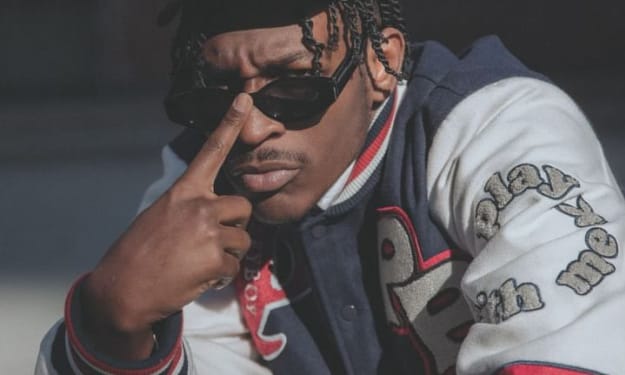The Flows of Poetic Justice
Artists & Audiences (1.1)
1988, Garvey High School. Malik “Phife Dawg” Taylor chills in a lunchroom with his soon to be A Tribe Called Quest brethren Kamaal “Q-Tip” Fareed and Ali Muhammad. It’s their senior year. The boys are just “lounging,” as Phife puts it quirkily, watching some of the flyest “honeys” around the block walk by them. Phife becomes infatuated with one of the girls—a femme fatale by the name of Flo—and in the coming days learns a valuable lesson in how misogyny and sexism can easily be flipped upon males. It’s basically the same story Eddie Murphy goes through some years later in Boomerang (shout out to a young Robin Givens and my babygirl Halle Berry), except this story is about hormone driven boys in high school. How do we know that? Phife and Tip recall these events for audiences in 1991’s smooth, silky track, “Butter” off The Low-End Theory.
This simple formula that has kept audiences engaged for almost three whole decades since the release of “Butter” was already present in recorded music during ATCQ’s youth. The same year of Phife and Flo’s tumultuous relationship, “F*ck tha Police” by N.W.A. is blasting out of speakers around them. Over on the West Coast, O’Shea “Ice Cube” Jackson, Eric “Eazy-E” Wright, Kim “Arabian” Nazel, and Andre “Dr. Dre” Young are all in protest after having experiences with police brutality, white government, and the criminalization of their hometown, Compton. They’ve got street rats in the hood huddled in circles spitting N.W.A. rhymes and crooning N.W.A. resentments like, “Police think they got the authority to kill a minority” and “Without a gun and a badge, what do you got? A sucker in a uniform waiting to get shot.” No one but the media (a.k.a. people who haven’t lived through Compton’s struggles) seems to find these lyrics horrifying. N.W.A. says these lyrics proudly from their perspectives and hold the truth (at least the truths they believe in) in every word. They know they have an audience and they’re just waiting for that audience to listen and wake up; stay awake if anything.
Now don’t get me wrong, in terms of subject matter, the ATCQ example is rather tepid in comparison to N.W.A.’s fearless critique of our justice system. But what I’m trying to point out here is that brilliant little thing that somehow keeps popping up like daisies in Hip-Hop and, quite honestly, music overall. Something we keep buying. This thing called “storytelling.” Where the f*ck did it come from and why is it here? How, and at what point, did street corners go from being concrete pavement to becoming the voice of 1950s doo-wop (as depicted in A Bronx Tale) and dope legend-born freestyles (Biggie’s infamous battle in Bed-Stuy, Brooklyn or a struggling Eminem in 8 Mile)? How did singing “Kumbaya” around the fire comfortably begin in urban cities and in our iPods? What was it that made these images something we feel at peace with?
The effect of ritualistic, spiritual creators such as Baaba Mal and Salif Keita seems to be worldwide. These are two men, for example, who apart from their recording careers, have deeper roots in studying the characters in early history that were deemed to be griots and troubadours. In recent decades, the original definitions of these words have become skewed, with the word “troubadour,” for example, being attached to artists like pop-singer Ed Sheeran, The Roots' lead rapper, Black Thought, and other musical acts throughout different levels of the music industry. This is perhaps another mishap and creation of a modern, westernized civilization’s lens on both European and African cultures. We believe what we want to believe, hear what we want to hear. But, by concept, the griot (of Africa) and troubadour (of the Middle Ages) are based in, for instance, what Geisha have been consistently to Japan—tradition. Both griots and troubadours’ anecdotes held information both valuable to universal audiences (thus the significance of Baaba and Salif) and locally in the regions where the traditions originated. Griots were storytellers based predominantly in the northern portions of West Africa. They were living archives and vessels of stories that were passed down from generation to generation, walking the streets singing their tales of history and human life within struggle so that truth and tradition wouldn’t be lost within the ever-coming future. Likewise, troubadours would travel throughout their lands, whether that be France, Spain or Italy, singing their own songs—the difference here being that troubadour lyrics and poems consistently surrounded topics such as “courtly love” and loyalty between romantic parties. All stories, no matter which character told them, tended to have morals and honesty.
Is any of this starting to sound familiar? It should.
In the mid-1600s, slavery had become the new iron fist of capitalism. The Dutch start importing slaves into a not yet independent America, while Britain, Spain, and France move most of their slaves to what we now know as the Caribbean islands. This epidemic of dark enterprise infests the western side of the globe, but, with it, comes the secrets and traditions of both griots and troubadours. Storytelling for the black slave did not cease and neither could the roundtable discussions of their owners. It was too harsh of a time to leave things unsaid, thus every passing moment seemed to be engaged through rhythmic tones and vocal harmonies dancing in the fields, with boisterous, colonial glee floating between the ships and plantations.
Fast forward to the late 1960s—reggae has hit the music industry hard; she’s the new kid on the block who wants her lunch money back, and she’ll be damned if she’s taking “No” for an answer. Artists like Bob Marley, Burning Spear, and so many more are spearheading an entire lifestyle against the ideas of greed and apartheid. Suddenly, there’s this political music that’s simultaneously fused with self-love and romance blowing up in Jamaica. To make things worse (or better; it all depends on who’s experiencing it), the stories being told are not all fictionalized—many of them are actually incriminating to the circumstances of Jamaica itself. People are hearing these stories, vibing out to them in dancehalls and listening to DJs excitedly “toasting” (a Jamaican form of DJ hosting) over new tracks they’ve received. It’s a grand ol’ time for everyone involved—especially since civil rights are now becoming available. The Negro in America is officially the African-American and his/her stories will soon be heard through certain spots of the radio waves. Similarly, in the 1970s, the outbreak of the Vietnam War has caused citizens of America to either fear or rebel against their government. A westernized parallel to the reggae movement enters the world’s sight, free love, and the hippies. Same type of traditions, same archetypes of creatives—same storytelling. Recording artists and music performers everywhere are beginning to make their marks on history and make sure people around them will tell their stories for years to come.
Phife and Flo never got back together. Anyone who heard the story knows that. But, none of that really matters, because Peter Rosenberg of Hot 97, Busta Rhymes, as well as many other artists and fans who ended up attending his memorial in 2016 (including myself), agree that, “A Tribe Called Quest wrote the soundtrack to my life.” The fact that there are people on this Earth that know “Butter,” “F*ck tha Police,” “I Shot the Sheriff,” and far more, completely by heart—as if they themselves were the ones who penned the stories—shows how incredibly powerful storytelling can be. It’s a tradition that is rooted in all the aforementioned artists’ creeds and creations. Even more so, the tradition is not only passed through the music to audiences, but even further to aspiring artists yet to hear them—sparking a new life and new takes upon the tradition.
REFERENCES
- “Salif Keita Live at New York’s Town Hall.” Afropop Worldwide, 25 Feb. 2018 | http://afropop.org/articles/salif-keita-live-at-new-yorks-town-hall .
- Harvilla, Rob. “The Homecoming King of Pop.” The Ringer, 6 Mar. 2017 | https://www.theringer.com/2017/3/6/16044272/ed-sheeran-divide-review-shape-of-you-eea729b62518 .
- Cobb, Jelani. “The Lesson of Black Thought’s Viral Freestyle.” The New Yorker, 17 Dec. 2017 | https://www.newyorker.com/culture/likes/the-lesson-of-black-thoughts-viral-freestyle .
- “Griot.” Encyclopædia Britannica, 24 Nov. 2014 | www.britannica.com/art/griot .
- “Troubadour.” Encyclopædia Britannica, 8 Apr. 2009 | www.britannica.com/art/troubadour-lyric-artist .
- “Slavery in America.” History, A&E Television Networks, 2009 | www.history.com/topics/black-history/slavery.
- Killakam. “Bob Marley in Africa.” OkayAfrica, 6 Feb. 2018 | www.okayafrica.com/bob-marley-africa .
- “Vietnam War.” HistoryNet, 25 Feb. 2018 | www.historynet.com/vietnam-war .
About the Creator
Amir Royale
« 24 | Artist | Educator | Entrepreneur »
« Saint Albans, Queens, NY »
-.-
Website: amirroyale.com
Linktree: linktr.ee/amirroyale






Comments
There are no comments for this story
Be the first to respond and start the conversation.